Bertrand Russell
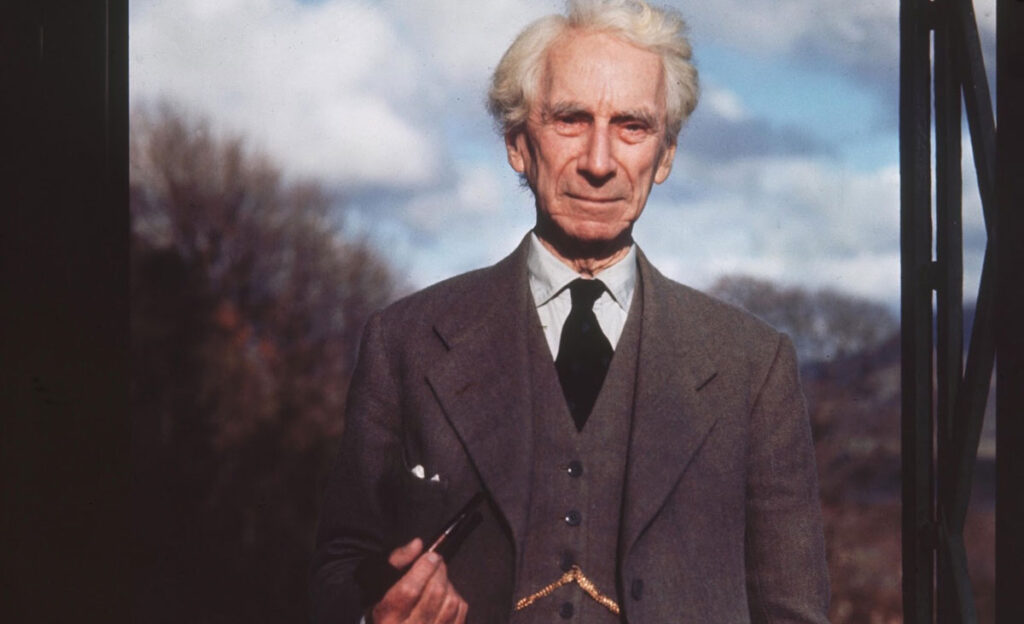
BERTRAND RUSSELL, 3rd Earl Russell, OM FRS was a Welsh-born polymath, philosopher, logician, mathematician, historian, writer, social critic, political activist, and Nobel laureate.
He was born at Trellech, Monmouthshire May 18, 1872, into one of the most prominent aristocratic families in the United Kingdom.
Throughout his life, Russell considered himself a liberal, a socialist and a pacifist, although he sometimes suggested that his sceptical nature had led him to feel that he had “never been any of these things, in any profound sense”.
In the early 20th Century, Russell led the British “revolt against idealism”. He is considered one of the founders of analytic philosophy along with his predecessor Gottlob Frege, colleague GE Moore and protégé Ludwig Wittgenstein. He is widely held to be one of the 20th Century’s premier logicians.
With AN Whitehead, he wrote Principia Mathematica, an attempt to create a logical basis for mathematics, the quintessential work of classical logic. His philosophical essay ‘On Denoting’ has been considered a “paradigm of philosophy”.
His work has had a considerable influence on mathematics, logic, set theory, linguistics, artificial intelligence, cognitive science, computer science and philosophy, especially the philosophy of language, epistemology and metaphysics.
Russell was a prominent anti-war activist, championed anti-imperialism, and chaired the India League. Russell was opposed to war from early on, his opposition to World War I being used as grounds for his dismissal as a lecturer from Trinity College at Cambridge.
Occasionally, he advocated preventive nuclear war, before the opportunity provided by the atomic monopoly had passed and he decided he would “welcome with enthusiasm” world government. He went to prison for his pacifism during World War I.
Later, Russell concluded that the war against Adolf Hitler’s Nazi Germany was a necessary “lesser of two evils” and also criticised Stalinist totalitarianism, condemned the involvement of the United States in the Vietnam War and was an outspoken proponent of nuclear disarmament.
In 1950, Russell was awarded the Nobel Prize in Literature “in recognition of his varied and significant writings in which he champions humanitarian ideals and freedom of thought”.
Russell was into an influential and liberal family of the British aristocracy. His parents, Viscount and Viscountess Amberley, were radical for their times. Lord Amberley consented to his wife’s affair with their children’s tutor, the biologist Douglas Spalding. Both were early advocates of birth control at a time when this was considered scandalous.
Lord Amberley was an atheist and his atheism was evident when he asked the philosopher John Stuart Mill to act as Russell’s secular godfather. Mill died the year after Russell’s birth, but his writings had a great effect on Russell’s life.
His paternal grandfather, the Earl Russell, had twice been Prime Minister in the 1840s and 1860s. The Russells had been prominent in England for several centuries before this, coming to power and the peerage with the rise of the Tudor dynasty. They established themselves as one of the leading British Whig families and participated in every great political event from the Dissolution of the Monasteries in 1536–1540 to the Glorious Revolution in 1688–1689 and the Great Reform Act in 1832.
Russell’s adolescence was very lonely, and he often contemplated suicide. He remarked in his autobiography that his keenest interests were in “nature and books and (later) mathematics saved me from complete despondency;” only his wish to know more mathematics kept him from suicide.
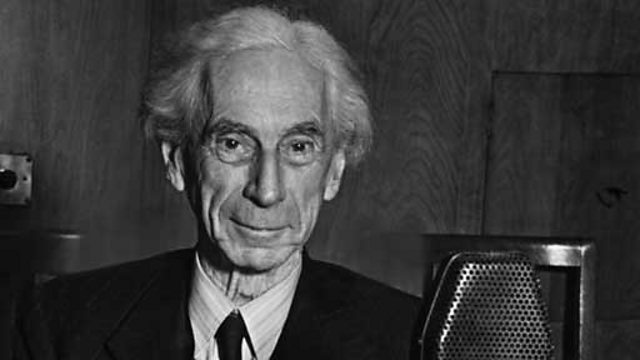
He was educated at home by a series of tutors. When Russell was 11 years-old, his brother Frank introduced him to the work of Euclid, which he described in his autobiography as “one of the great events of my life, as dazzling as first love.”
During these formative years he also discovered the works of Percy Bysshe Shelley. Russell wrote: “I spent all my spare time reading him, and learning him by heart, knowing no one to whom I could speak of what I thought or felt, I used to reflect how wonderful it would have been to know Shelley, and to wonder whether I should meet any live human being with whom I should feel so much sympathy.”
Russell claimed that beginning at age 15, he spent considerable time thinking about the validity of Christian religious dogma, which he found very unconvincing. At this age, he came to the conclusion that there is no free will and, two years later, that there is no life after death. Finally, at the age of 18, after reading Mill’s Autobiography, he abandoned the ‘First Cause’ argument and became an atheist.
Russell won a scholarship to read for the Mathematical Tripos at Trinity College, Cambridge, and commenced his studies there in 1890. He quickly distinguished himself in mathematics and philosophy, graduating as seventh Wrangler in the former in 1893 and becoming a Fellow in the latter in 1895.
Russell was 17 years old in the summer of 1889 when he met the family of Alys Pearsall Smith, an American Quaker five years older, who was a graduate of Bryn Mawr College near Philadelphia. He soon fell in love with the puritanical, high-minded Alys, and, contrary to his grandmother’s wishes, married her on December 13, 1894.
Their marriage began to fall apart in 1901 when it occurred to Russell, while he was cycling, that he no longer loved her. A lengthy period of separation began in 1911 with Russell’s affair with Lady Ottoline Morrell, and he and Alys finally divorced in 1921 to enable Russell to remarry.
During his years of separation from Alys, Russell had passionate (and often simultaneous) affairs with a number of women, including Morrell and the actress Lady Constance Malleson.
Russell began his published work in 1896 with German Social Democracy, a study in politics that was an early indication of a lifelong interest in political and social theory.
In 1903 he published The Principles of Mathematics, a work on foundations of mathematics. It advanced a thesis of logicism, that mathematics and logic are one and the same.
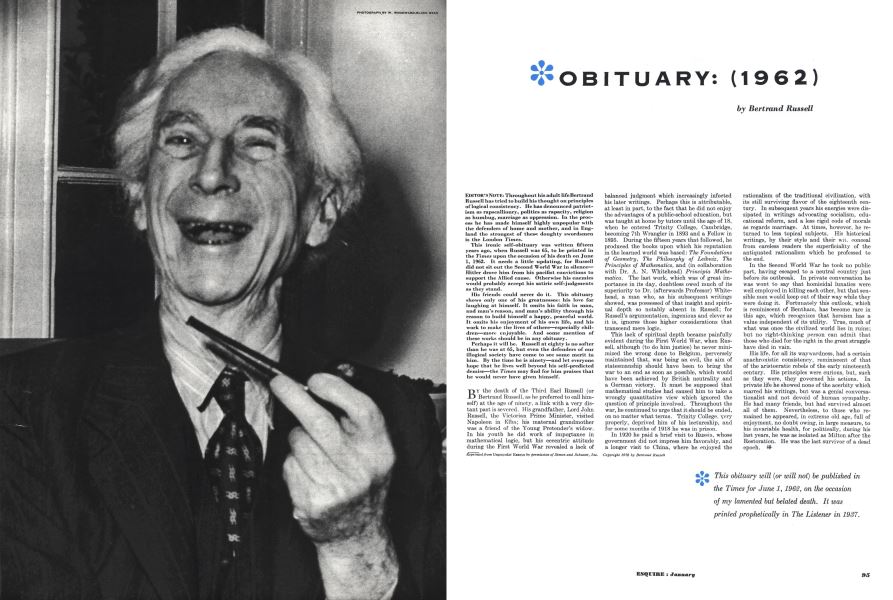
In 1905 he wrote the essay ‘On Denoting’, which was published in the philosophical journal Mind. Russell was elected a Fellow of the Royal Society (FRS) in 1908. The three-volume Principia Mathematica was published between 1910 and 1913. This, along with the earlier The Principles of Mathematics, soon made Russell world-famous in his field.
During World War I, Russell was one of the few people to engage in active pacifist activities. Russell played a significant part in the Leeds Convention in June 1917, a historic event which saw well over a thousand “anti-war socialists” gather; many being delegates from the Independent Labour Party and the Socialist Party, united in their pacifist beliefs and advocating a peace settlement.
His conviction in 1916 resulted in Russell being fined £100 (equivalent to £5,600 in 2019), which he refused to pay in hope that he would be sent to prison, but his books were sold at auction to raise the money. The books were bought by friends; he later treasured his copy of the King James Bible that was stamped “Confiscated by Cambridge Police”.
A conviction for publicly lecturing against inviting the United States to enter the war on the United Kingdom’s side resulted in six months’ imprisonment in Brixton Prison in 1918. He later said of his imprisonment: “I found prison in many ways quite agreeable. I had no engagements, no difficult decisions to make, no fear of callers, no interruptions to my work. I read enormously; I wrote a book, Introduction to Mathematical Philosophy… and began the work for The Analysis of Mind.”
In 1925, Russell was asked by the Council of Trinity College to give the Tarner Lectures on the Philosophy of the Sciences; these would later be the basis for one of Russell’s best-received books: The Analysis of Matter, published in 1927.
In August 1920, Russell travelled to Soviet Russia as part of an official delegation sent by the British government to investigate the effects of the Russian Revolution. He wrote a four-part series of articles, titled ‘Soviet Russia—1920’, for the US magazine The Nation.
He met Vladimir Lenin and had an hour-long conversation with him. In his autobiography, he mentions that he found Lenin disappointing, sensing an “impish cruelty” in him and comparing him to “an opinionated professor”. He subsequently wrote a book, The Practice and Theory of Bolshevism, about his experiences on this trip.
In the 1922 and 1923 general elections Russell stood as a Labour Party candidate in the Chelsea constituency, but only on the basis that he knew he was extremely unlikely to be elected in such a safe Conservative seat, and he was unsuccessful on both occasions.
Upon the death of his elder brother Frank, in 1931, Russell became the 3rd Earl Russell.
Russell’s marriage to his second wife, Dora Black, ended when they separated in 1932 and finally divorced. On January 18, 1936, Russell married his third wife, an Oxford undergraduate named Patricia (‘Peter’) Spence, who had been his children’s governess since 1930. Russell and Peter had one son, Conrad Sebastian Robert Russell, 5th Earl Russell, who became a prominent historian and one of the leading figures in the Liberal Democrat party.
Before World War II, Russell taught at the University of Chicago, later moving on to Los Angeles to lecture at the UCLA Department of Philosophy. He was appointed professor at the City College of New York (CCNY) in 1940, but after a public outcry the appointment was annulled by a court judgment that pronounced him “morally unfit” to teach at the college due to his opinions, especially those relating to sexual morality, detailed in Marriage and Morals (1929).
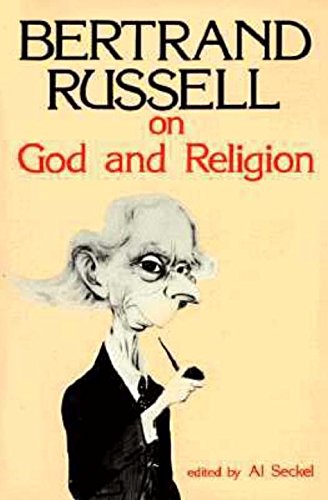
Russell joined the Barnes Foundation, lecturing to a varied audience on the history of philosophy; these lectures formed the basis of A History of Western Philosophy. He returned to the UK in 1944 to rejoin the faculty of Trinity College.
Russell participated in many broadcasts over the BBC, particularly The Brains Trust and the Third Programme, on various topical and philosophical subjects.
En route to one of his lectures in Trondheim, Russell was one of 24 survivors (among a total of 43 passengers) of an aeroplane crash in Hommelvik in October 1948. He said he owed his life to smoking since the people who drowned were in the non-smoking part of the plane. A History of Western Philosophy (1945) became a best-seller and provided Russell with a steady income for the remainder of his life.
Just after the atomic bombs exploded over Hiroshima and Nagasaki, Russell wrote letters and published articles in newspapers from 1945 to 1948, stating that it was morally justified and better to go to war against the USSR using atomic bombs while the United States possessed them and before the USSR did.
In 1948, Russell was invited by the BBC to deliver the inaugural Reith Lectures — what was to become an annual series of lectures, still broadcast by the BBC. His series of six broadcasts, titled Authority and the Individual, explored themes such as the role of individual initiative in the development of a community and the role of state control in a progressive society.
In the King’s Birthday Honours of June 9, 1949, Russell was awarded the Order of Merit and the following year he was awarded the Nobel Prize in Literature.
In 1950, Russell attended the inaugural conference for the Congress for Cultural Freedom, a CIA-funded anti-communist organisation committed to the deployment of culture as a weapon during the Cold War. Russell was one of the best-known patrons of the Congress, until he resigned in 1956.
In 1952, Russell was divorced by Spence. Russell married his fourth wife, Edith Finch, soon after the divorce, on December 15, 1952. In June 1955. Russell leased Plas Penrhyn in Penrhyndeudraeth, Merionethshire, Wales, and a year later it became his and Edith’s principal residence. Edith remained with him until his death on February 2, 1970. His body was cremated at Colwyn Bay and his ashes were scattered over the Welsh mountains.
In September 1961, at the age of 89, Russell was jailed for seven days in Brixton Prison for ‘breach of peace’ after taking part in an anti-nuclear demonstration in London. The magistrate offered to exempt him from jail if he pledged himself to “good behaviour”, to which Russell replied: “No, I won’t.”
In 1962, Russell played a public role in the Cuban Missile Crisis: in an exchange of telegrams with Nikita Khrushchev, Soviet leader Khrushchev assured him that his government would not be reckless. Russell sent this telegram to President Kennedy:
‘YOUR ACTION DESPERATE. THREAT TO HUMAN SURVIVAL. NO CONCEIVABLE JUSTIFICATION. CIVILIZED MAN CONDEMNS IT. WE WILL NOT HAVE MASS MURDER. ULTIMATUM MEANS WAR… END THIS MADNESS.’
Russell spent the 1950s and 1960s engaged in political causes primarily related to nuclear disarmament and opposing the Vietnam War. The 1955 Russell–Einstein Manifesto was a document calling for nuclear disarmament and was signed by 11 of the most prominent nuclear physicists and intellectuals of the time.
In 1963 he became the inaugural recipient of the Jerusalem Prize, an award for writers concerned with the freedom of the individual in society.
In 1966–1967, Russell worked with Jean-Paul Sartre and many other intellectual figures to form the Russell Vietnam War Crimes Tribunal to investigate the conduct of the United States in Vietnam. He wrote a great many letters to world leaders during this period.
Russell was the author of more than 60 books and over 2,000 articles. He published his three-volume autobiography in 1967, 1968, and 1969. He also made a cameo appearance playing himself in the anti-war Hindi film Aman, by Mohan Kumar, which was released in India in 1967.
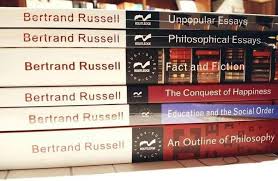
Russell was an active supporter of the Homosexual Law Reform Society, being one of the signatories of AE Dyson’s 1958 letter to The Times calling for a change in the law regarding male homosexual practices, which were partly legalised in 1967, when Russell was still alive.
On January 31, 1970, Russell issued a statement condemning “Israel’s aggression in the Middle East” and, in particular, Israeli bombing raids being carried out deep in Egyptian territory as part of the War of Attrition. He called for an Israeli withdrawal to the pre-Six-Day War borders. This was Russell’s final political statement or act. It was read out at the International Conference of Parliamentarians in Cairo on February 3, 1970, the day after his death.
He was a member of the Advisory Council of the British Humanist Association and President of Cardiff Humanists until his death.
His works can be found in anthologies and collections, including The Collected Papers of Bertrand Russell, which McMaster University began publishing in 1983. By March 2017, this collection of his shorter and previously unpublished works included 18 volumes, and several more were in progress. A bibliography in three additional volumes catalogues his publications. The Russell Archives held by McMaster’s William Ready Division of Archives and Research Collections possess over 40,000 of his letters.
Lady Katharine Jane Tait, Russell’s daughter, founded the Bertrand Russell Society in 1974 to preserve and understand his work. It publishes the Bertrand Russell Society Bulletin, holds meetings and awards prizes for scholarship.
In 1980, a memorial to Russell was commissioned by a committee including the philosopher AJ Ayer. It consists of a bust of Russell in Red Lion Square in London sculpted by Marcelle Quinton.
In Reflections on My Eightieth Birthday (‘Postscript’ in his Autobiography), Russell wrote: “I have lived in the pursuit of a vision, both personal and social. Personal: to care for what is noble, for what is beautiful, for what is gentle; to allow moments of insight to give wisdom at more mundane times. Social: to see in imagination the society that is to be created, where individuals grow freely, and where hate and greed and envy die because there is nothing to nourish them. These things I believe, and the world, for all its horrors, has left me unshaken”.
BACK TO HOME PAGE